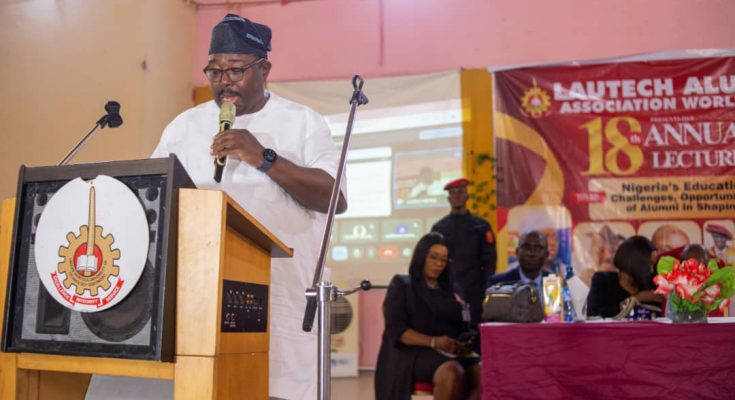Senator Sharafadeen Alli (APC-Oyo South) has underscored the need for a united effort to overhaul Nigeria’s struggling education sector. Speaking at the 18th annual LAUTECH Alumni Lecture, held in the institution’s Great Hall in Ogbomoso, Alli called on alumni, the government, and private sector partners to actively engage in addressing the sector’s pressing challenges.
In his lecture, titled “Revamping Nigeria’s Education: Addressing Challenges, Alumni Contributions, and Funding Strategies,” Senator Alli outlined key obstacles hindering the sector’s progress and proposed collaborative solutions. Addressing an audience of alumni, educators, and students, he emphasized that a well-funded and effective education system is essential for national development.
“Our education system is fundamental to Nigeria’s advancement, yet critical issues, including chronic underfunding and inadequate infrastructure, impede its progress,” Alli stated. He highlighted that Nigeria’s educational budget allocation is far below UNESCO’s recommended 26%, a disparity that severely affects the quality of education, especially in rural areas where resources are already limited.
Without adequate funding, he noted, public institutions struggle to maintain suitable learning environments, ultimately impacting the quality of education they can provide. He pointed to overcrowded classrooms, lack of libraries and laboratories, and dilapidated facilities as major challenges that diminish the sector’s effectiveness. “Infrastructure deficiencies, especially in rural schools, hinder students’ ability to learn and develop the skills necessary for Nigeria’s future,” he added.
Senator Alli stressed that alumni could play a pivotal role in addressing these issues by offering financial support, scholarships, and mentorship. He urged alumni to step in as change agents, bridging gaps between education and the workforce by supporting infrastructure development and guiding students on career paths.
Moreover, he advocated for increased Public-Private Partnerships (PPPs) to support critical needs like vocational training, which he said could significantly enhance employability. Alli argued that private sector involvement could supplement government efforts, providing essential resources and expanding learning opportunities for students across the country.
He concluded by calling for a unified approach, stressing that sustainable funding and strategic collaboration are key to ensuring equitable, high-quality education. “A well-educated populace is essential for national progress. Together, with commitment and unity, we can build an education system that empowers Nigeria’s youth and paves the way for a brighter future,” he said.




